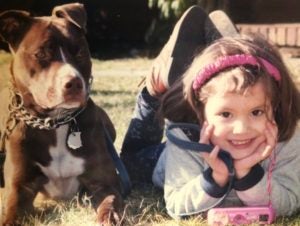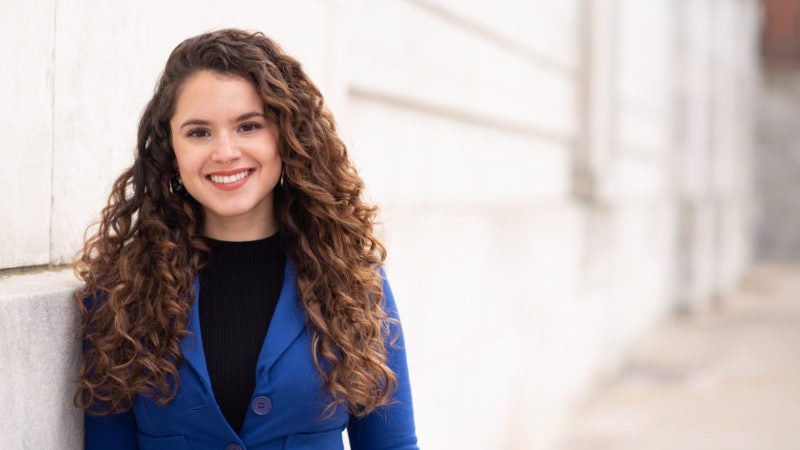Profile photo by Celia Muto
One of the primary responsibilities of our nervous system is to sense our environment. I am interested in how sensory neurons acquire and maintain specialized properties to accurately send information about the world to the brain. I currently study this in the auditory system, which contains exquisitely optimized neurons for our sense of hearing.
The focus of my study is to pinpoint how the neurons in our ear acquire specialized features to reliably communicate auditory information from our cochlea—the hearing organ deep in our ear—up to the brain. Ultimately, understanding how these neurons develop these features and maintain them through adulthood may help us prevent and treat hearing loss (both from aging and noise trauma).
How did you get interested in science?
I was born in Guadalajara, Mexico and came to the United States with my parents when I was four. My mother, who is also from Mexico, is a middle school Spanish teacher and a Zumba instructor (bailar es su pasión). My father grew up in Hyannis, MA and is a jack-of-all-trades. He has held a host of eclectic jobs ranging from landscaper to taxicab driver and now is a freelance photographer for local news stories on Cape Cod. He even runs his own online news source.
My parents divorced shortly after we arrived in the US. While growing up, I lived between two homes, switching houses every couple of days. Both of my parents were commendable single parents and had to work endless hours to support me. As an only child navigating this experience, I was often left alone to find creative ways to entertain myself outside or reading if it was a rainy day. I was intensely curious about the world around me. I would often conduct (what I now know were) behavioral experiments with bugs and squirrels in my yard (e.g. do squirrels prefer a pile of 20 acorns close to their nest or a pile of 40 acorns farther from their nest?).

Photo of Isle, her dog Chacha and her first camera. Taken in her front yard, circa 1996. (Courtesy of Isle Bastille & family)
Although I had no narrative or example for a career as a scientist, I was naturally inclined to use these “experiments” to describe and explain natural phenomena occurring around me. For a long time, I believed you had to look like Albert Einstein and have weird hair to be a scientist. So, as a child I aspired to be a veterinarian because I wanted to keep my childhood best friend, a lovingly overprotective pitbull named Chacha, alive forever. (Unfortunately that didn’t happen. RIP Chacha.)
It wasn’t until almost 15 years later when I was a sophomore in college that I discovered science existed as a profession. I still remember landing my first job as a technician in a biomedical engineering lab led by Dr. Chris Schaffer, developing methods to optically access the intact nervous system. After he offered me the position, I left his office and cried tears of joy in the elevator. I was beside myself with disbelief that someone was willing to take a chance on me and hire me to do science. Soon after, I also received an offer to work in Dr. Barbara Finlay’s lab in evolutionary development on a project comparing the evolution of the avian and mammalian visual system. I couldn’t fathom the idea of turning down these wonderful opportunities, so I accepted both offers and worked in both labs simultaneously throughout the rest of my undergrad career. Although the work in each lab was completely different, these initial experiences were incredibly formative in shaping my scientific thinking. These labs gave me the opportunity to fall in love with science. I am forever grateful to Dr. Schaffer and Dr. Finlay and to all my mentors thereafter (Dr. Hoy, Dr. Cepko, Dr. Duff, all the members on my dissertation advisory committee and my thesis adviser, Dr. Goodrich), both for believing in me and for launching my scientific career.
What is the hardest part about the work you do?
The largest challenge I’ve had to overcome is allowing myself to dream big. Early in life, I was limited by my environment. My mother is an immigrant and knew very little about the process of attending college in the United States. My father, who left the US while I was in high school, could only support me from afar. We were extremely worried about affording college. My dream was to get a college degree and I was determined to apply. Yet, when I did, I often filtered colleges based on the tuition, the application cost and whether they were in state. I never let myself even dream of attending an Ivy League institution. I visited Cornell because of its excellent veterinary program. But I considered that visit as my last because of the competitively low acceptance rate and absurdly high cost of tuition, room and board. I am so thankful to my mother for valiantly navigating the daunting application for financial aid. I was also fortunate to have phone calls with my dad and wonderful mentors who said: “What’s the worst that can happen? Go for it. You might get rejected but then again, you might not”. I pooled birthday money and my retail job paychecks for the applications and went for it.
I will never forget the day I received the acceptance letter and financial aid to attend Cornell. I equate that moment to Charlie receiving the famous golden ticket in Charlie and the Chocolate Factory. I know that sounds dramatic—but my outlook on life completely changed after that, and it’s been a whimsical experience ever since.
I still have a hard time believing I belong in academia. I always feel one step behind or like I missed a critical primer on how to navigate this career. I don’t see any faculty with a background similar to mine. It can be isolating at times and often difficult to envision myself as a PI when I have no role models in that position. Luckily, I have mentors and friends in my community who believe in me every step of the way and are slowly chipping away at my imposter syndrome. Every chance I get I want to pay it forward and be a catalyst for other latinx, female, curiosity-driven, disadvantaged, quietly dreaming students to believe in themselves. I want to show them that they too can be a scientist (Sí se puede!).
I’m still surprised sometimes when I scooter into work and see Harvard Medical School embossed on those shiny marble walls. I am grateful every day. Little me couldn’t have possibly imagined this is where I would be today, but I’m sure she would have come up with some killer hypotheses about the bunnies on the quad.
Who or what most inspires you?
My mother and my father. I am the living embodiment of all the obstacles they have faced and overcome. They are both very different people, but they live passionately and express all aspects of their identity as often as they can. More importantly, they have never enforced that I study hard or pursue a certain career—just that I do things I enjoy. I take this advice seriously by following my passion in this career while making sure I maintain my other passions outside of lab such as photography, art and weightlifting. I admire my parents so much and emulate them as often as possible. My mother loves to dance, teach and be with her family. My father loves to document the world around him through photography. I like to document the world around me through microscopy and if you know me at all, you know I’ll never turn down a chance to dance.

